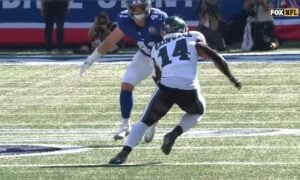Though not uncommon for the era, Pittsburgh Steelers Hall of Fame quarterback Terry Bradshaw was famous for calling his own plays when he was on the field. Nowadays, it almost seems incredible in spite of the fact that today’s quarterback prospects are more prepared than ever, yet coordinating an offense remains the legislation of coaches, primarily.
While Bradshaw takes a lot of pride in this, he did admit that he wishes he had a deeper understanding of the offense and what he was asked to do—the whys rather than the whats and the hows. And there’s a part of him that wishes he had the opportunity to play for offensive minds like Bill Walsh or Don Coryell. Yet he doesn’t wish he had a coordinator calling his plays.
“If I had those guys as my coach, first of all, you learn the offense, then you study the offense and the application”, he told Jay Glazer on the Unbreakable podcast, which was just recently posted on YouTube, though seems to have been recorded in December. “The key is not knowing what Trips Right Flood E is. Okay, there it is, why am I going Trips Right Flood E? Here’s what it does to the defense?”.
“See, that’s what you want to know”, he continued. “‘Okay, when I get this defense, where is the weakness? Where do I go? What if they blitz?’ So I gather as much knowledge as I can about one formation, and if I could do that with Coryell and the others I talked about and learn all of that stuff, I would prefer to call my own plays”.
Bradshaw’s early-career struggles after being drafted first overall in 1970 are well documented, as is the tumultuous relationship that he had with head coach Chuck Noll. It took him time to develop, but by the latter stages of his career, he had become an All-Pro talent.
One wonders how ‘self-taught’, so to speak, he was in terms of the offense and the work that he must have put in trying to understand the concepts he was being taught from a global perspective. It’s one thing to know what to do but knowing why you’re doing it and what it’s supposed to accomplish it a whole different level.
Whether he always know why he was doing things or not, however, Bradshaw would never willingly relinquish play-calling responsibilities—as he pointed out, offensive coordinators have bad games, too, and when they do, the quarterback gets the blame.
“If I’m gonna sink or swim, I want to sink or swim making my own choice, but I want to be educated”, he said. “I want to make sure that I apply all of this with the proper understanding of what it dictates to a defense and where I can go with it”.
It’s hard to raise the conversation of “what might have been” when it comes to a Hall of Famer and four-time Super Bowl champion, but if Bradshaw had been in a situation that better nurtured him and developed his game from the neck up, perhaps how much better he could have become, or at least how much earlier he could have reached his highest level is certainly a question.








